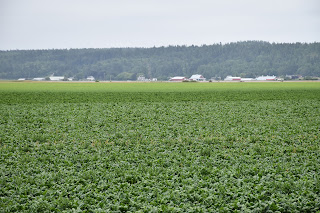Specialty Crop Block Grant Program
 |
| Skagit Valley field of spinach, considered a specialty crop. |
As the lead for partners from Washington, Idaho and Montana, LINC Foods received a $300,000 grant focusing on food safety. LINC is a worker and farmer-owned cooperative business that calls itself “a one-stop shop for local, sustainable food.”
The competition was tough. Out of 11 proposals that WSDA reviewed and forwarded on to the USDA, LINC’s was the only one awarded a grant. USDA only awarded funds to four multi-state projects across the U.S.
This year, WSDA is one of some 20 states that will again act as the “administrator” of selected multi-state projects under current USDA Agricultural Marketing Service (AMS) competition for new projects.
States competing for $7 million
Specialty crop programs are funded through the 2014 Farm Bill. This round, some $7 million in federal funds are available to boost the specialty crop industry. Specialty crops include fruits, vegetables, tree nuts and nursery crops. Washington ranks second nationally for producing specialty crops.
We hope to have one or more of Washington’s applications be selected in this current round. Projects can address regional or national-level specialty crop issues, and deal with food safety, plant pests and disease, research, or projects addressing common issues specific to specialty crops, such as marketing and promotion.
Sept. 25 proposal deadline to WSDA
Proposals are due by 2 p.m., Sept. 25, and should be emailed to WSDA at SCMP@agr.wa.gov.
We’d be glad to discuss the grant process. Contact me via email or by calling 360-902-2091.
A few details
- Review USDA’s 2017 Request for Applications to be aware of requirements.
- Grant amounts range from $250,000 to $1 million.
- Proposals must have at least two partners with substantive involvement in the project. Partners must be located in different states.
- Submit applications to a participating state department of agriculture such as WSDA.
- Specialty crop producer groups, associations, organizations, tribal governments, universities, nonprofits, and other stakeholder groups are encouraged to apply.
- Projects can take up to three years for completion, but must start in 2017.









